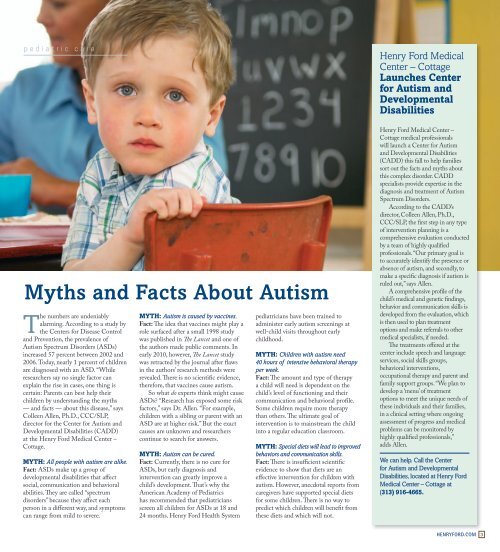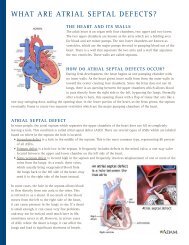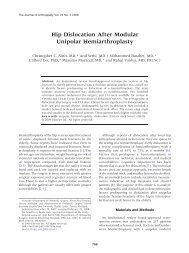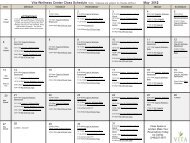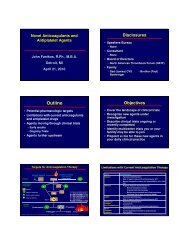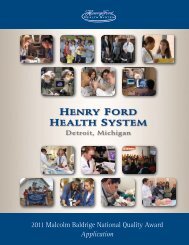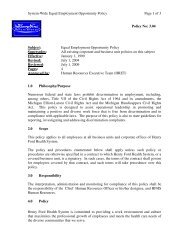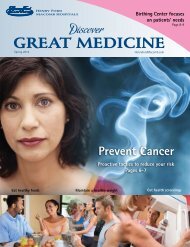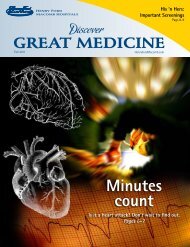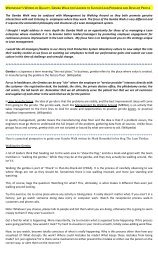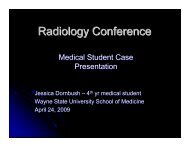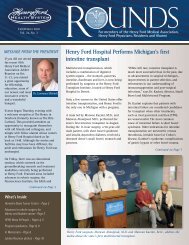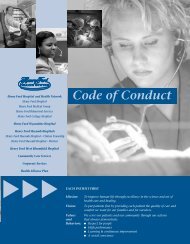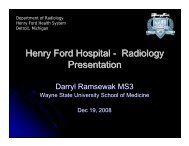Live Well Summer 2011 - Henry Ford Health System
Live Well Summer 2011 - Henry Ford Health System
Live Well Summer 2011 - Henry Ford Health System
Create successful ePaper yourself
Turn your PDF publications into a flip-book with our unique Google optimized e-Paper software.
p e d i a t r i c c a r eMyths and Facts About AutismThe numbers are undeniablyalarming. According to a study bythe Centers for Disease Controland Prevention, the prevalence ofAutism Spectrum Disorders (ASDs)increased 57 percent between 2002 and2006. Today, nearly 1 percent of childrenare diagnosed with an ASD. “Whileresearchers say no single factor canexplain the rise in cases, one thing iscertain: Parents can best help theirchildren by understanding the myths— and facts — about this disease,” saysColleen Allen, Ph.D., CCC/SLP,director for the Center for Autism andDevelopmental Disabilities (CADD)at the <strong>Henry</strong> <strong>Ford</strong> Medical Center –Cottage.Myth: All people with autism are alike.Fact: ASDs make up a group ofdevelopmental disabilities that affectsocial, communication and behavioralabilities. They are called “spectrumdisorders” because they affect eachperson in a different way, and symptomscan range from mild to severe.Myth: Autism is caused by vaccines.Fact: The idea that vaccines might play arole surfaced after a small 1998 studywas published in The Lancet and one ofthe authors made public comments. Inearly 2010, however, The Lancet studywas retracted by the journal after flawsin the authors’ research methods wererevealed. There is no scientific evidence,therefore, that vaccines cause autism.So what do experts think might causeASDs? “Research has exposed some riskfactors,” says Dr. Allen. “For example,children with a sibling or parent with anASD are at higher risk.” But the exactcauses are unknown and researcherscontinue to search for answers.Myth: Autism can be cured.Fact: Currently, there is no cure forASDs, but early diagnosis andintervention can greatly improve achild’s development. That’s why theAmerican Academy of Pediatricshas recommended that pediatriciansscreen all children for ASDs at 18 and24 months. <strong>Henry</strong> <strong>Ford</strong> <strong>Health</strong> <strong>System</strong>pediatricians have been trained toadminister early autism screenings atwell-child visits throughout earlychildhood.Myth: Children with autism need40 hours of intensive behavioral therapyper week.Fact: The amount and type of therapya child will need is dependent on thechild’s level of functioning and theircommunication and behavioral profile.Some children require more therapythan others. The ultimate goal ofintervention is to mainstream the childinto a regular education classroom.Myth: Special diets will lead to improvedbehaviors and communication skills.Fact: There is insufficient scientificevidence to show that diets are aneffective intervention for children withautism. However, anecdotal reports fromcaregivers have supported special dietsfor some children. There is no way topredict which children will benefit fromthese diets and which will not.<strong>Henry</strong> <strong>Ford</strong> MedicalCenter – CottageLaunches Centerfor Autism andDevelopmentalDisabilities<strong>Henry</strong> <strong>Ford</strong> Medical Center –Cottage medical professionalswill launch a Center for Autismand Developmental Disabilities(CADD) this fall to help familiessort out the facts and myths aboutthis complex disorder. CADDspecialists provide expertise in thediagnosis and treatment of AutismSpectrum Disorders.According to the CADD’sdirector, Colleen Allen, Ph.D.,CCC/SLP, the first step in any typeof intervention planning is acomprehensive evaluation conductedby a team of highly qualifiedprofessionals. “Our primary goal isto accurately identify the presence orabsence of autism, and secondly, tomake a specific diagnosis if autism isruled out,” says Allen.A comprehensive profile of thechild’s medical and genetic findings,behavior and communication skills isdeveloped from the evaluation, whichis then used to plan treatmentoptions and make referrals to othermedical specialists, if needed.The treatments offered at thecenter include speech and languageservices, social skills groups,behavioral interventions,occupational therapy and parent andfamily support groups. “We plan todevelop a ‘menu’ of treatmentoptions to meet the unique needs ofthese individuals and their families,in a clinical setting where ongoingassessment of progress and medicalproblems can be monitored byhighly qualified professionals,”adds Allen.We can help. Call the Centerfor Autism and DevelopmentalDisabilities, located at <strong>Henry</strong> <strong>Ford</strong>Medical Center – Cottage at(313) 916-4665.henryford.com 3


